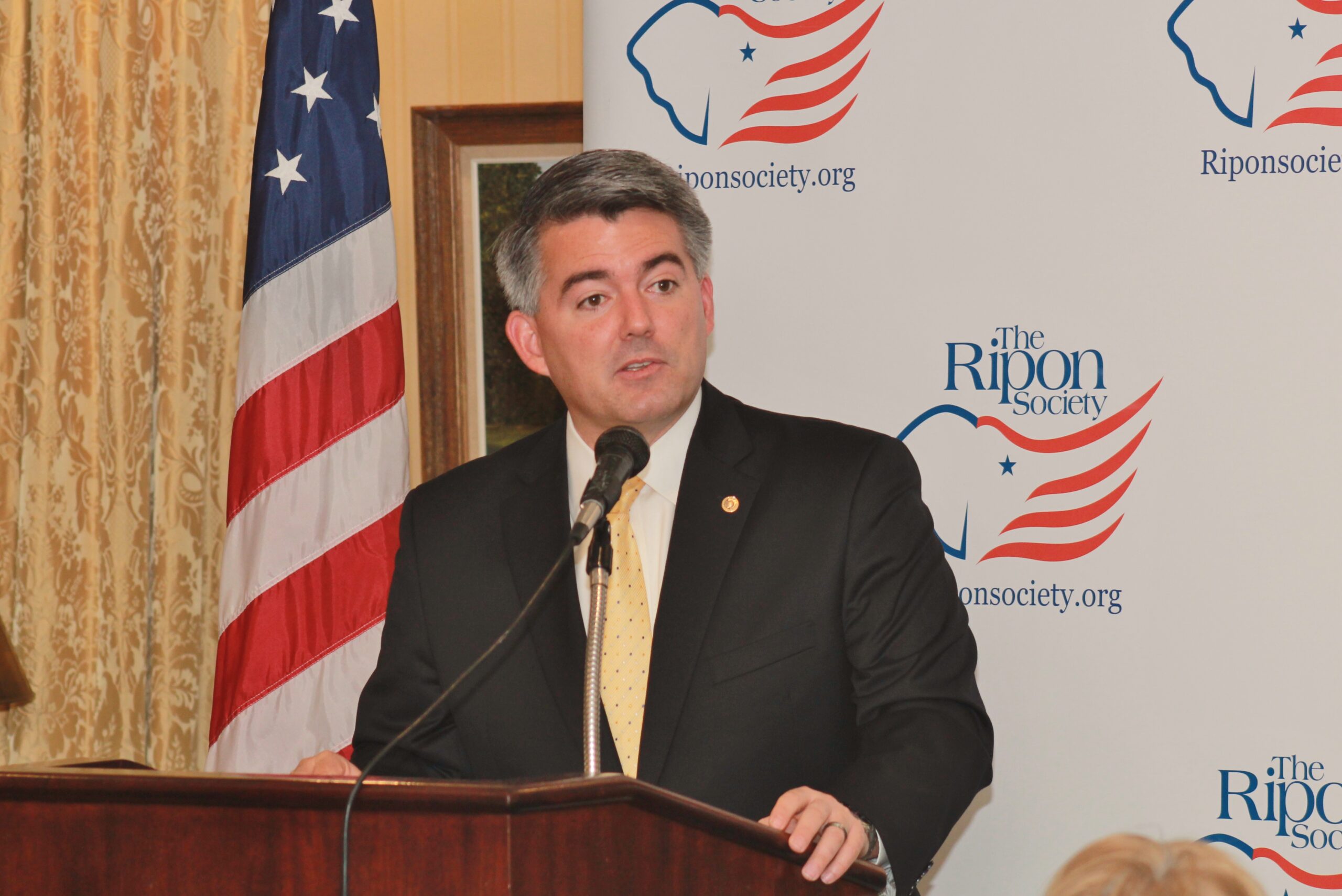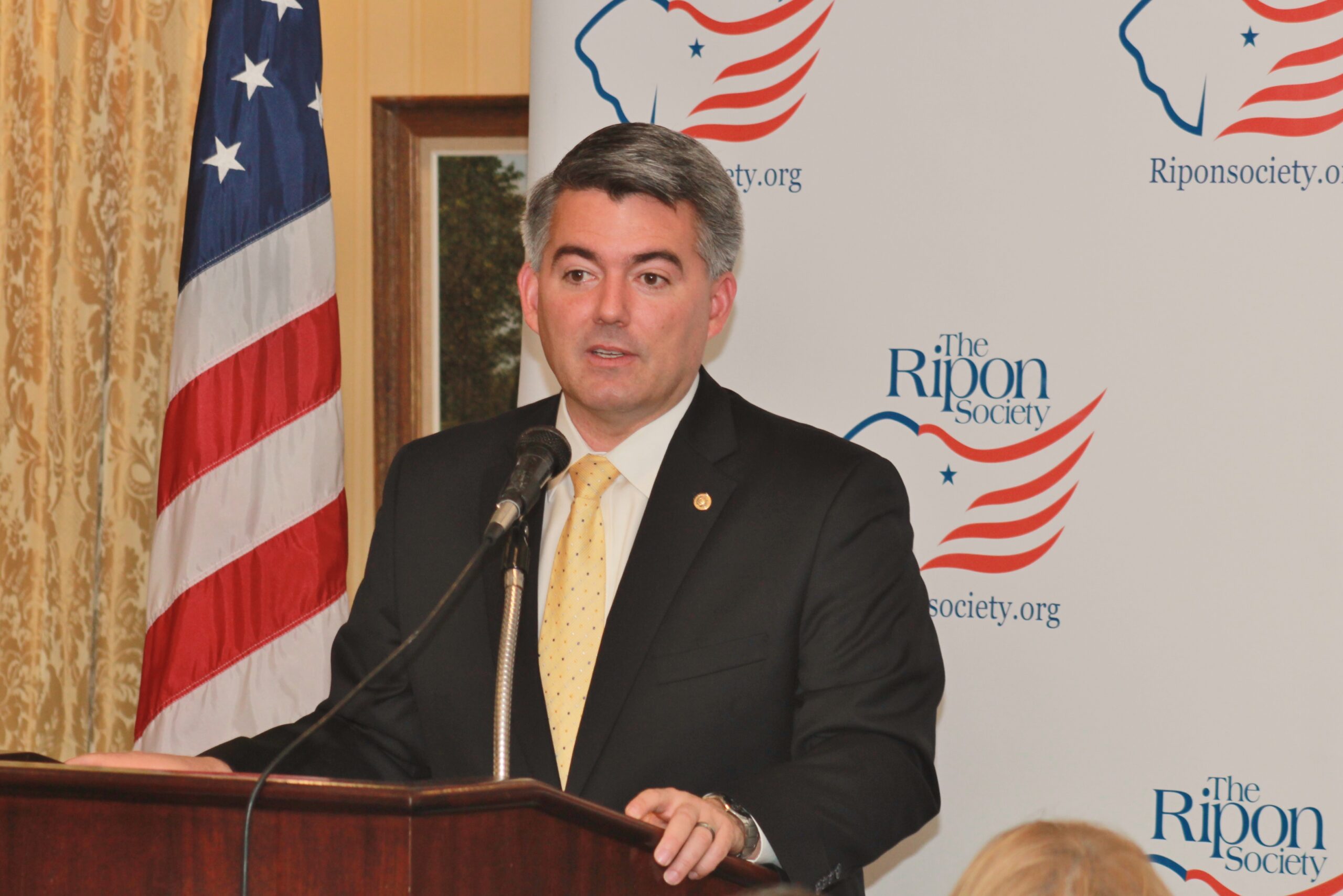
WASHINGTON, DC – U.S. Senator Cory Gardner (R-CO) appeared before a breakfast meeting of The Ripon Society this past Thursday, delivering remarks in which he said it’s time to rein in the Obama Administration’s regulatory overreach at home, and restore America’s leadership around the world.
“I’ve done over two dozen economic roundtables across Colorado,” Gardner stated. “The first thing people mention to get this economy growing and create jobs is to let America work – to get government out of the way and let people run their businesses the way they believe is best for them. Sure, we have rules and regulations, but the government can’t be trying to hold the steering wheel for them at the same time, and in some cases, trying to manufacture the steering wheel.”
“In the State of Colorado, we have Rule Review bills every year where the state legislature votes up or down on whether or not a rule or regulation from the executive branch should go into effect. It’s something that’s worked very well in Colorado, and it’s something that many states do. We should do the same thing in Congress. If a rule or regulation comes out of the Executive Branch, then Congress ought to vote up or down on whether that rule or regulation should be put into effect.”
Gardner is serving his first term in the U.S. Senate after serving two terms in the House. During his five years in Congress, he has made a name for himself as a leader in the fight to make government smaller and smarter – something, he said, that requires not just effective oversight, but effective budgeting and appropriations, as well.
“The other thing I believe we have to do in order to achieve better oversight is figuring out how to budget and how to authorize in a time frame that allows us to do both well,” the Colorado lawmaker said. “And I don’t just mean the Budget Act. I mean the appropriations process in its entirety, and I mean oversight as in getting the committees to work.
“Look at what’s happening in terms of the amount of legislating and the amount of lawmaking that’s now coming out of the regulatory agencies. How do we address it? Number one, I believe that taking a look at biennial budgeting is something we ought to do. In that first year you could focus on budgeting and the appropriations process, and then give yourself the rest of that biennial cycle to focus on oversight and regulatory investigations, and to do the work of the committees to authorize departments and agencies.
“There are entire Cabinet-level agencies, like the State Department, that haven’t been authorized. For years, they’ve gone without authorization. When we did the Intelligence Authorization in the House a few years ago, it was the first time that had happened in a number of years if not decades. To have these important and critical programs going forward with no oversight or authorization – I think that’s a responsibility that we have to make sure we are taking up and fixing.”
To help provide this kind of oversight, Gardner noted, he has introduced the Reducing Excessive Government (REG) Act, a plan that would require that any increase in the debt limit approved by Congress and the President also be matched by a dollar-for-dollar decrease in regulatory burden. In addition to plans like this one, he said that Congress also needed to take another look at sunset review laws, something that Colorado and over two dozen other states have long had on the books.
“What was it that Ronald Reagan used to say?” Gardner said. “‘The closest thing to immortal life is a government program.’ If we can change that to create a sunset on legislation and regulations that we put forward, then it’s constantly being reviewed by Congress. Again, it’s a lesson from the states, and something we should be taking into account.”

In addition to discussing domestic policy and the Administration’s regulatory overreach, Gardner also talked about foreign policy and the President’s lack of leadership around the world.
“When you talk to the foreign policy experts around the country and around the globe,” he stated, “I think every single one of them will tell you that at no point in our history have they seen a more challenging set of foreign policy conflicts, challenges, and risks. The situation on the Korean peninsula, for instance, according to Admiral Gortney, who heads up NorthCom, is at its most unstable point since the Armistice of 1953.
“So if you look across the arc of foreign policy, what do we see? Across the arc of foreign policy, we see failed U.S. leadership. Failed U.S. leadership from what appears to be a withdrawal of that leadership from the world scene. If you start in the Middle East, you can see it. You can see a vacuum created by the United States. What has happened in Syria as Russia’s been allowed to backfill, as Iran has been allowed to backfill – the vacuum of leadership that was created. And look at what happened in Ukraine and Crimea with Russia’s entrance there.”
“Around the globe, we are seeing these challenges and failures. I think it stems directly from an administration whose world view has been one of, ‘Let’s just step back because we can’t do it. Let’s lead from behind. These bad guys are junior varsity, not varsity. We have them contained, and everything’s under control.’ At every single point, this administration, I believe, has made significant mistakes that have led to the empowerment of rogue regimes and dictators around the globe.”
To counter these mistakes and to begin restoring U.S. strength around the world and, in particular, on the Korean Peninsula, Gardner – who serves as Chairman of the Foreign Relations Subcommittee on East Asia, the Pacific, and International Cybersecurity Policy – introduced legislation last fall to impose stringent new mandatory sanctions on North Korea. The bill was approved overwhelmingly by the House and Senate and signed into law by the President last week. According to Gardner, the legislation – and the demonstration of American resolve – could not have come soon enough.
“It’s critically important that we show leadership in Asia as we continue to work to rebalance our policy,” he declared. “We need to show that we are in the region to stay, and that we will not walk away from a world that is filled with bad people when our allies need our help.”
The Ripon Society is a public policy organization that was founded in 1962 and takes its name from the town where the Republican Party was born in 1854 – Ripon, Wisconsin. One of the main goals of The Ripon Society is to promote the ideas and principles that have made America great and contributed to the GOP’s success. These ideas include keeping our nation secure, keeping taxes low and having a federal government that is smaller, smarter and more accountable to the people.



